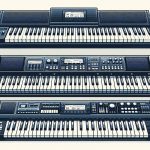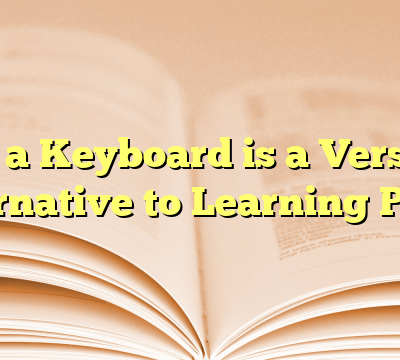Learning to play the keyboard as an adult might seem like a daunting task. After all, we often hear about musical prodigies who started their training in diapers. But does that mean if you've missed the boat in childhood, you're out of luck? Not at all.
The truth is, adults have some unique advantages when it comes to learning instruments, including the keyboard. They're often more disciplined, motivated, and have a better understanding of how they learn best. So, if you're an adult thinking about tickling those ivories, you might be surprised at how achievable it can be.
Understanding the Challenges
Learning to play the keyboard as an adult comes with its set of challenges. While adults benefit from enhanced discipline and motivation, several obstacles can make the journey slightly tough. Recognizing these hurdles is the first step toward overcoming them and moving forward on one’s musical journey.
Time Management
The most common challenge faced by adults learning the keyboard is finding the time. Juggling responsibilities such as work, family, and social commitments means that practice often takes a back seat. They need a strategy to carve out regular, dedicated practice sessions to progress. It's not just about squeezing practice time into a busy schedule but making it a non-negotiable part of their daily routine.
Physical Flexibility
Adults might find that their fingers are not as flexible or responsive as they would like. This can lead to frustration when attempting to master complex chords or rapid transitions. Effective techniques and exercises designed to increase dexterity and reduce tension can help alleviate this challenge.
Setting Realistic Expectations
Another significant hurdle is the lofty expectations adults often set for themselves. Many aspire to reach a certain level of proficiency within a short time frame, which can lead to disappointment if progress is slower than anticipated. Understanding that learning an instrument is a gradual process, and celebrating small achievements can help keep motivation high.
Overcoming Mental Blocks
Fear of failure often hampers adults more than children. The self-imposed pressure to quickly excel can create mental blocks, making it harder to absorb new information or perform pieces confidently. Adults benefit greatly from adopting a growth mindset, viewing each mistake as a learning opportunity rather than a setback.
Finding the Right Learning Resources
In today’s digital age, there are countless resources available for learning the keyboard. However, not all resources are created equal, and what works for one learner might not suit another. Adults have to navigate through a plethora of books, online tutorials, and apps to find the ones that cater to their learning style and musical interests.
Integrating Theory and Practice
Many adults struggle with integrating music theory into their practice. While they might excel at playing by ear or reproducing melodies, understanding the theory behind music enables them to become versatile musicians. Catering time to learn about scales, chords, and rhythm can enhance their ability to improvise and compose music.
Advantages of Learning as an Adult

While several challenges are inherent in learning the keyboard as an adult, there are significant advantages that should not be overlooked. Adults bring to the table a level of discipline and motivation often not found in younger learners. This maturity translates into a more organized approach to learning, where goals are set, and steps to achieve these goals are systematically followed.
One of the key advantages is the ability to self-direct learning. Adults are typically better at identifying what they do not know and taking the initiative to fill these gaps. Whether it's through online tutorials, apps, or formal lessons, adult learners can tailor their educational journey to fit their personal taste and learning pace. This degree of autonomy enhances the overall learning experience, making it more enjoyable and effective.
Moreover, adults often have a better appreciation for music. This appreciation can transform the learning process from being just another task to a deeply fulfilling personal journey. The emotional connection to the music can serve as a powerful motivator, driving learners to continue practicing and improving even when faced with difficulties.
Another advantage is the development of a newfound social circle. Joining music groups or classes exposes learners to like-minded individuals, fostering friendships and opportunities to collaborate. These social interactions not only make the learning process more fun but also provide a support system that can be incredibly beneficial for motivation and growth.
| Attribute | Adult Learners |
|---|---|
| Investment in Quality Instruments | More likely to afford better keyboards and learning tools |
| Access to Learning Materials | Can invest in a wider range of books, apps, and courses |
| Private Lessons | More financially equipped to hire personal tutors |
Financial stability is another aspect where adult learners have an edge. They're often in a position to invest in high-quality instruments and resources that can significantly enhance the learning experience. From owning a good quality keyboard to subscribing to comprehensive online courses, having the necessary tools at disposal makes a huge difference in progress and motivation.
Effective Learning Strategies

When embarking on the journey of learning the keyboard as an adult, adopting effective learning strategies can substantially ease the process and make it more enjoyable. Understanding that each individual's learning curve varies, there are several tried-and-true methods that can aid in smoothing the path to musical proficiency.
Set Clear Goals
Firstly, setting clear, achievable goals is crucial. Whether it's mastering a particular song, understanding chord progressions, or improving finger agility, having specific milestones to aim for keeps learners focused and motivated. Break down large goals into smaller, manageable tasks to prevent feelings of overwhelm and to track progress more effectively.
Regular Practice
Consistency is key. Regular practice, even if it's just for 15 to 30 minutes a day, can work wonders. It's not about the length of the practice session, but the quality and regularity. Adults often have busy schedules, but carving out dedicated practice time can significantly enhance skill development and muscle memory.
Use Technology
Leveraging technology can also be quite beneficial. There's a wealth of resources available online, from video tutorials and interactive apps to digital sheet music. These tools not only make learning more accessible but also more engaging. They allow learners to practice at their own pace and time, which suits the adult learner's lifestyle.
Mix Learning Methods
Diversifying learning methods can prevent monotony and boost retention. Adult learners should mix formal lessons, whether in-person or online, with self-taught sessions. By doing so, they can benefit from professional guidance while also having the freedom to explore and experiment on their own. Joining online forums or community groups can also provide valuable support and advice from fellow learners.
Incorporate Theory and Practical
A balance between theory and practical application is essential. Understanding the theory behind music can enrich the learning experience, making it easier to grasp complex pieces later on. However, it should not overshadow the practical aspect of playing. Therefore, applying theoretical knowledge to actual playing scenarios is beneficial for reinforcing learning and making practice sessions more interesting.
Enjoy the Process
Lastly, enjoying the process and celebrating small victories along the way can make learning the keyboard as an adult not just a goal to achieve but a fulfilling journey to experience. Adult learners should remember why they started and allow their love for music to be the driving force behind their efforts.
Setting Realistic Expectations

Embarking on the journey to learn the keyboard as an adult can be an exhilarating yet intimidating experience. While the enthusiasm to master an instrument is commendable, it's equally important to set realistic expectations early on. Adult learners must understand that mastery doesn't happen overnight and that progress may sometimes feel slow. By aligning expectations with reality, it becomes easier to stay motivated and avoid discouragement.
First and foremost, they should acknowledge the learning curve associated with picking up a new skill later in life. Unlike children, whose brains are like sponges soaking up new information, adults might find it a bit more challenging to memorize scales, chords, and music theory. Patience is key. Celebrating small victories, like mastering a new chord or playing a simple song from start to finish, can provide a sense of achievement and encourage further learning.
Another critical aspect of setting realistic expectations involves time management. Adults typically have to juggle multiple responsibilities, including work, family, and social commitments. Finding time to practice can be a challenge, and it's essential to be honest about how many hours per week can realistically be dedicated to keyboard lessons and practice. Consistent, focused practice sessions, even if short, are far more beneficial than sporadic, lengthy sessions.
It's also helpful to establish clear, measurable goals. Setting both short-term and long-term objectives can help adult learners track their progress and maintain focus. For instance, a short-term goal might be to learn a new song each month, while a long-term goal could be to perform confidently at a small gathering by the year's end.
Lastly, incorporating a variety of learning resources can make the journey less daunting and more enjoyable. Online tutorials, apps, and digital tools offer interactive and flexible learning solutions that cater to different learning styles and paces. Adults should take advantage of these resources to supplement their learning.
By setting realistic expectations, adult learners can navigate the challenges of learning the keyboard with a positive attitude and resilience. It's not about the speed of reaching the destination but the richness of the journey that matters. With a clear understanding of what to expect, they can carve a path that's both fulfilling and enjoyable, buoyed by gradual progress and personal satisfaction.
Overcoming Frustration and Plateaus

For many adult learners, starting the journey to learn the keyboard is met with enthusiasm and excitement. However, as the initial progress begins to slow down, frustration and plateaus can become common challenges. It's crucial for learners to recognize that these periods of seemingly stagnant progress are a natural part of learning any new skill.
One effective strategy for overcoming these challenges is breaking down goals into smaller, more manageable tasks. Rather than aiming to master a complex piece in a week, learners might focus on perfecting a single measure each day. This approach not only makes the learning process more manageable but also provides a sense of accomplishment along the way.
Engaging with a supportive community can also play a significant role in pushing through tough times. Many online forums and local groups exist where fellow learners share their experiences, tips, and encouragement. Knowing they’re not alone in their struggles can be a huge morale booster for adult learners.
Experimenting with different learning methods is another key to overcoming plateaus. Diversifying the learning experience can reignite interest and help learners discover new ways to understand challenging concepts. For example, if traditional practice methods are leading to boredom or frustration, incorporating music games or apps might introduce a refreshing twist to the routine.
It's also vital for learners to remind themselves of why they started learning the keyboard in the first place. Revisiting initial goals and aspirations can rekindle motivation during times of discouragement. Whether it's to play a favorite song, to share music with friends and family, or simply to enjoy a new hobby, keeping the end goal in sight can help learners ride out the rough patches.
Regular reflection on progress made thus far can help learners appreciate how far they've come. Documenting the learning journey through recordings or journal entries provides tangible evidence of improvement, which can be especially encouraging during times when progress feels slow.
Lastly, setting aside time to play pieces they love, regardless of their current learning plan, can remind learners of the joy of playing music. It’s important to balance discipline and structure with moments of free play and exploration to keep the learning experience enjoyable.
As adult learners navigate the ups and downs of learning the keyboard, adopting these strategies can help them maintain momentum and stay on track toward their musical goals.
Conclusion
Learning the keyboard as an adult certainly comes with its set of challenges but it's far from impossible. By setting realistic goals and embracing the journey with patience, anyone can make significant strides. Remember, every musician started somewhere, and the joy of creating music can make every step of the process worthwhile. So, keep experimenting, stay connected with fellow learners, and don't forget to celebrate the small victories along the way. After all, it's the love for music and the determination to grow that transforms beginners into seasoned players.
Harlan Kilstein began playing piano during covid with no piano background at all. He taught himself how to play learning what to do and what not to do.
Today he's an advanced intermediate player and can help you grow in your skills because he learned all this on his own.








